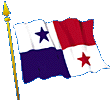The government of the Republic of Panama, by means of Law No. 9 of the 30th. of May, 2000, established the Black Ethnicity Day.
 The original idea around the creation of a Law for this effect was born from the inspiration and vision of a son of Chiriqui Province, specifically from la Arenas de Puerto Armuelles, the Honorable Claral Richards, afropanamanian, whose personal attributes stands out as been the national champion disc thrower during the First National games of 1955 and as a pitcher of the San Francisco Giants in the minor leagues. This outstanding athlete to the date of his retirement was Supervisor in the United Fruit Co.
The original idea around the creation of a Law for this effect was born from the inspiration and vision of a son of Chiriqui Province, specifically from la Arenas de Puerto Armuelles, the Honorable Claral Richards, afropanamanian, whose personal attributes stands out as been the national champion disc thrower during the First National games of 1955 and as a pitcher of the San Francisco Giants in the minor leagues. This outstanding athlete to the date of his retirement was Supervisor in the United Fruit Co.
The Legislator, the Honorable Osman Gómez, who in fulfillment of an electoral campaign promise made to the Hon. Richards, took before the Legislative Assembly the corresponding draft of a law creating a Day to honor the Black man and woman of the Republic of Panama. They summon the historical knowledge of Professor Elias Colley, who, due to an intense work of investigation and documentation, was the technical and historical sustentation of the First draft of the Law sent to the Commission of Human rights of the legislative Assembly and it was later integrated into the basic guidance of the law.
 An Ad hoc Committee was established consisting of the following members: Camara de Comercio Afropanameña (CAMCAP); the Savings and Loans Coop. of Cristobal; the Society of Friends of the Afro West Indian Museum of Panamá (SAMAAP) and a diverse group of citizens, made possible what is proudly herald by the afro Panamanian population: "National Black Ethnicity Day", signed into Law by the first female president of Panama, Sra. Mireya Moscoso. 1999-2004.
An Ad hoc Committee was established consisting of the following members: Camara de Comercio Afropanameña (CAMCAP); the Savings and Loans Coop. of Cristobal; the Society of Friends of the Afro West Indian Museum of Panamá (SAMAAP) and a diverse group of citizens, made possible what is proudly herald by the afro Panamanian population: "National Black Ethnicity Day", signed into Law by the first female president of Panama, Sra. Mireya Moscoso. 1999-2004.
 The 30th. of May 1851, is the day slavery was officially ended in the Province of Panama, Nueva Granada by the governor José De Obaldía. The Province of Panama in 1903 separated from Colombia to later become the Republic of Panama.
The 30th. of May 1851, is the day slavery was officially ended in the Province of Panama, Nueva Granada by the governor José De Obaldía. The Province of Panama in 1903 separated from Colombia to later become the Republic of Panama.
Elias Colley
Anthony McLean for the Internet

